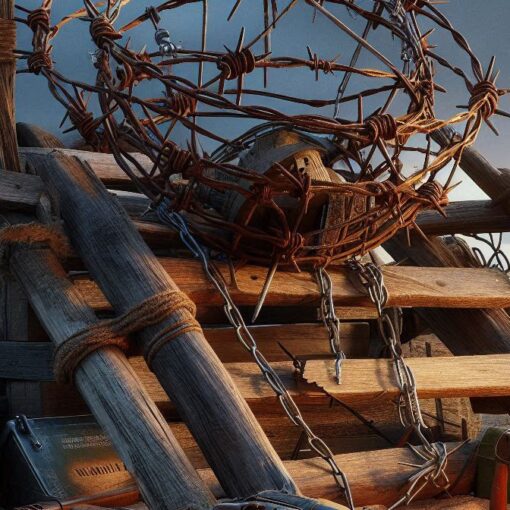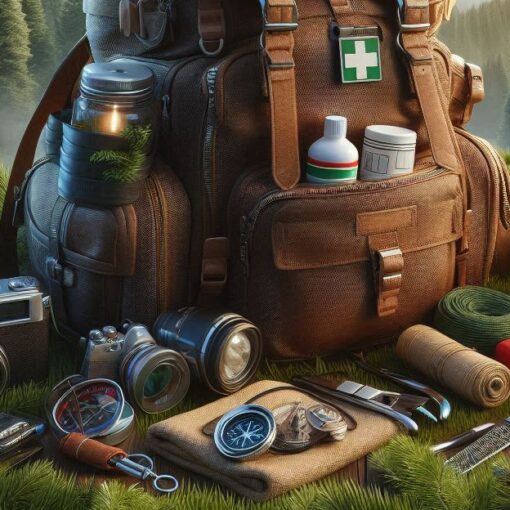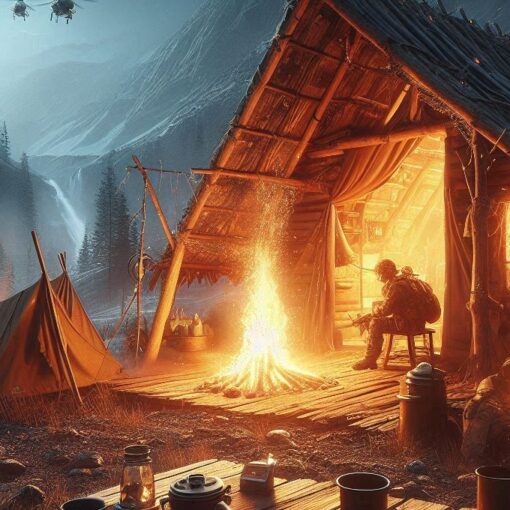Top Takeaways and Key Concepts
- Learn basic self-defense skills to increase confidence and escape dangerous situations.
- Pack smart safety tools like pepper spray, whistle, or flashlight to stay prepared.
- Stay aware of surroundings by researching terrain, wildlife, and weather before trips.
- Create a safety plan and share your route and return time with someone you trust.
- Trust your instincts and leave immediately if something feels unsafe.
Summary of This Article
This article encourages women to build confidence and stay safe in outdoor and survival situations through preparation, awareness, and self-defense. It emphasizes learning simple but effective self-defense moves, packing essential safety gear, and practicing camping basics before heading out alone. It also highlights the importance of researching the environment to avoid hidden dangers, staying aware of surroundings, and having backup tools like a map, GPS, or whistle. A safety plan should always be shared with a trusted person, and modern technology like portable chargers and safety apps can offer extra protection. Above all, the article reminds readers to listen to their instincts, which are often the first warning sign when something isn’t right.
Short Video Version of this Article
Everyone should know how to stay alive. But women often have to deal with various problems when it comes to remaining safe in the outdoors or in an emergency.
I recall the first time I went camping by myself. I was really excited, but I was also a little terrified. It was when I was out there alone that I realized how crucial it is to have the correct abilities and a good plan. It’s like going on a big adventure with your eyes wide open.
Please Note: This post may contain affiliate links. If you click one of them, we may receive a commission at no extra cost to you. As an Amazon Associate, I earn from qualifying purchases.

Let’s talk about some things that can help women feel safer and more sure of themselves in any survival circumstance. First of all, it can be very good to know some fundamental self-defense maneuvers. Being ready makes a significant difference. You don’t have to be a black belt; just mastering a few fundamental moves might make you feel more sure of yourself.
Packing smart is also very important! For extra precaution, bring things like pepper spray or a whistle. They are little but powerful! If something doesn’t feel right, listen to your instincts and make sure you have everything you need near by.
Before you go camping, practice putting up your tent. It’s the worst when bugs are flying about your head and you can’t see what you’re doing. Having a buddy system is also great, even if it’s just someone texting you to see how you’re doing.
It’s also great to have some things from home, like a favorite blanket or picture, to remind you that it’s alright to be nervous sometimes. We all do!
These ideas can make outdoor activities less scary and a lot more pleasant. Enjoy every moment and embrace the wild! You can do it!
Understanding Your Environment

The first step to staying safe is to be aware of what’s going on around you. Everything matters while you’re outside, from the ground under your feet to the creatures that are around.
It helps a lot to know where you’re going before you go camping or trekking. Could certain animals be dangerous? What is the weather generally like? These things can truly make a difference.
I remember going on a hike in the woods last summer. I learned that some plants can hurt you if you touch or eat them. Oh no! But knowing about those plants before I went through the woods made me feel lot more prepared and sure of myself. It was like having a hidden map that kept me out of trouble.
You can stay safe if you know how to recognize threats. When you’re out in nature, you don’t want any surprises. It also helps to pay attention to your surroundings, like looking for animal tracks or listening for sounds in the trees.
Being alert makes outdoor activities a lot more fun. You may enjoy all the beauty around you without worrying too much. So, before you go on your trip, make sure to get some information. It’s worth it!
As a matter of fact, carrying a detailed map or GPS device is vital too! If you ever get lost, having these tools on hand will help you regain your bearings quickly—no need to panic when you’ve got resources at your fingertips.
Building Physical Strength

When you’re trying to stay alive, it’s quite crucial to be healthy. You don’t have to become an athlete overnight; merely working on your strength and endurance might make you feel more confident. Wow, it feels great to be able to move large things or hike long distances without being too fatigued.
I recall taking self-defense classes. I wanted to learn how to defend myself, but it also made me feel good about my body! Those classes taught me some useful skills for when things go rough. They also helped me remember things better. That’s like teaching your body to move quickly when things get tough.
Exercise every day is good for both your body and your mind. You can do anything that makes you happy, like running, lifting weights, or even yoga. You don’t have to accomplish everything all at once. Just get started tiny.
Every single thing matters. You’ll get a little stronger and more ready for whatever that comes your way every day! Think back to times when you surprised yourself. Like when you find out you can carry that large backpack up the hill without stopping? That’s the vibe we want! Keep going; you can do it!
Learning Self-Defense Techniques

Learning how to keep oneself safe is one of the best things you can do, especially for women. Being powerful isn’t the only thing that matters in self-defense. It’s also about being alert and having a sound plan.
Years ago, I took my first self-defense lesson. I learnt a lot of fantastic moves that would help me get away from someone or fight back if I needed to. But the most important lesson wasn’t only about those moves. It was all about being aware of what was going on around me.
Take a time to glance around before you go into a parking lot or a new campground. Look around and see who else is there. Trust your gut if something doesn’t seem right or seems unusual. If you feel uncomfortable, it’s fine to leave. Your feelings are important.
It’s easy to lose track of time when we’re on our phones or thinking, isn’t it? A fast look can make a tremendous difference. You might see someone acting strangely or see an exit nearby that you can use later.
Being aware of your surroundings keeps you safe and boosts your confidence. Being attentive makes you feel stronger both within and out. Take a moment to look around the next time you’re out and about. You can do this!
Creating a Safety Plan

A proper safety strategy can make you feel better when you’re out, whether you’re with friends or by yourself. It’s nice to know that others can find you, especially if you’re in the middle of nowhere.
I usually tell someone I trust about my plans before I go on an outdoor activity. Just a short talk! I tell them where I’m going and when I think I’ll be back. That way, they know where to go if something goes wrong. And let’s be honest: cell service can be rather bad outside of cities. It’s smart to have backup plans.
Think about it. You might also wish to pack some things you need in case of an emergency. If you need aid, whistles are a terrific way to get it. They may be little, but they are strong! You also need a torch with extra batteries. You never know when you’ll need to find your way or when it will get dark.
These small items can make a big impact in an emergency. It’s all about being safe and ready so you can enjoy being outside without worrying. Adventure is fun, but being ready makes it even more fun!
Utilizing Technology Wisely

These days, technology is everywhere. It’s pretty cool how we can use gadgets to stay safe while having fun outdoors! There are mobile apps that give you real-time weather updates and alerts about wildlife near trails or campsites. Super handy, right?
I remember one time hiking when the weather suddenly changed. I had my app ready and it warned me just in time to find shelter. Phew!
Portable chargers are lifesavers too. They keep your phone charged during long trips away from civilization. You want to be able to reach friends or family if something goes wrong. Having that connection feels comforting.
Think about personal alarms, too. These little devices make loud noises when you pull a pin or press a button. They’re easy to carry around and really effective at scaring off unwanted attention. If you’re out alone after dark, they can help keep you safe by making sure people know you’re there.
It’s nice knowing that with a few simple gadgets, we can enjoy our adventures without worrying too much. Staying connected and being prepared makes all the difference!
Listening to Your Gut
Don’t ever ignore your inner feelings. When things get hard, they’re like a little voice inside you that tells you what to do. We have pretty powerful instincts, especially when we’re outside and under stress.
I remember trekking on a trail I wasn’t too familiar with. Everything was peaceful, but my stomach felt weird. I didn’t ignore it; I listened to that sensation and turned around right away. That option kept me from getting into a bad situation that may have been dangerous!
It’s remarkable how much power you can get from believing your gut. Those instincts may really assist you out whether you’re trying to decide which way to go on a trek or if someone is safe to chat to.
We can believe we’re overreacting, but our bodies usually know what’s best for us. So the next time you feel that small push inside, pay attention! It is there to protect you and help you make healthy decisions.
Frequently Asked Questions
1. Why is self-defense important for women in outdoor or survival situations?
Self-defense builds confidence and provides practical skills to escape dangerous encounters. Even basic moves like wrist releases, palm strikes, or targeting sensitive areas can help you defend yourself long enough to get away and seek help.
2. What safety tools should I carry when camping, hiking, or traveling alone?
Essential tools include a whistle, pepper spray, flashlight, personal alarm, and a fully charged phone or GPS. These small items are easy to pack but offer powerful protection in emergencies.
3. How can I stay aware of my surroundings outdoors?
Research your environment before you go—learn about local wildlife, terrain, and weather. While outside, look for signs like footprints, broken branches, or sudden silence, and avoid distractions like loud music or constant phone use.
4. What should be included in a safety plan before going on a trip?
A solid safety plan includes sharing your route, destination, and return time with someone you trust, carrying emergency supplies, and having a backup plan in case your phone loses signal or battery.
5. Do I need to be physically strong to survive outdoors?
You don’t need to be a professional athlete, but improving endurance and strength helps you handle challenges like hiking long distances, carrying gear, or reacting quickly in survival situations.
6. How can technology help keep me safe outdoors?
Safety apps, GPS trackers, and weather alerts keep you informed and connected. Portable chargers and emergency communication tools ensure you can reach help even when off the grid.
7. When should I trust my instincts in a survival or safety situation?
Always. If a person, place, or situation feels wrong, leave immediately. Gut feelings are your built-in alarm system and often react to danger before your mind fully understands it.
If you want, I can also turn these FAQs into a short YouTube script, blog section, or TikTok voiceover. Just say the word!
Suggested Resources:
Self-Defense Tips for Women
https://www.rainn.org/articles/self-defense-tips-women
Women’s Outdoor Adventure Skills
https://www.outdoorafro.com/womens-adventure-skills
Personal Safety Apps
https://www.techradar.com/news/best-personal-safety-apps

Kevin Collier is a seasoned outdoor enthusiast and writer for Trekbug.com, specializing in outdoor adventures, survival strategies, and prepping insights. With a deep love for nature and a commitment to self-sufficiency, Kevin empowers readers to embrace the wilderness confidently. He shares valuable tips, practical techniques, and inspiring stories, helping both novice and experienced adventurers develop essential skills for surviving and thriving in the great outdoors.





